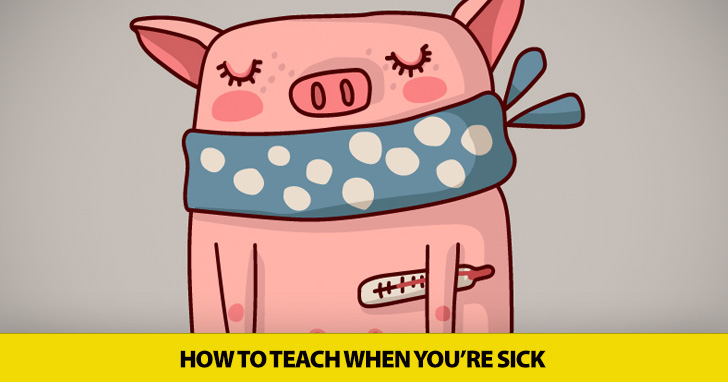
In a perfect world, we’d all be able to call in sick when we need to.
Employers would be understanding and compassionate, quickly reorganizing the school’s schedule around our impending absence, and perhaps sending us a get-well basket while we take it easy. If you work in such circumstances, then we all envy you. On the other hand, if calling in sick would send your boss into a spin, wreck the day’s schedule and result in a classroom full of unruly students with no one to chaperone them, then like so many of us you’re just going to have to manage. Here are some hints for surviving a day of teaching when you feel like a million cents.

Use These 10 Important Tips to Teach When You’re Sick
-
1
Treat the Symptoms
Perhaps obviously, the place to start is medication. This isn’t a moment of indulge your homeopathic curiosity. Pile on the painkillers, fever reducers, stomach pills, whatever you need to keep yourself going. Bring plenty of extras to school with you.
If you’re struggling with a hangover, there are thousands of remedies out there, but a combination of painkillers, rehydration solution (Gatorade or another), and antacids will help. Some people are starting to trust milk thistle (Silymarin) and Schizandra, which protect the liver and may help boost your recovery.
-
2
Drink Fluids
Another obvious step, particularly for colds and hangovers, and again you should bring plenty of water, sports drinks or your own rehydration concoction to class with you.
-
3
Consider Green Tea
The research is in, and it’s conclusive. Green tea provides a steady and even caffeine boost while supplying antioxidants and a host of other helpful, natural chemicals. From nausea to hangovers and the flu, it can and will help.
-
4
Recognize Your Limitations
Today is going to suck. Accept that from the outset and focus on damage limitation. You may be able to hand over some of your schedule to a colleague, get your boss to agree that you’ll teach a half-day, or organize a low-intensity lesson such as a session in the computer lab or a period of quiet research for an upcoming presentation. Cancel or postpone whatever you can.
-
5
Scale Back Your Responsibilities
This means changing the shape and style of your lessons. Slim down presentation time; this means less new material, so you may not be able to address all of the day’s target language. Instead, focus on practice and consolidation, research, writing, and other hands-off work which won’t depend on guidance or classroom management from you. Good ideas include:
- Plentiful review of material from the previous day / week / month. Student-to-student quizzing is a great way to do this.
- Use the tests often found at the end of each textbook chapter.
- Organize a debate on a hot topic, but take yourself out of the center by appointing team leaders, and perhaps a moderator. Give the students time to read and prepare their points, then either moderate with a light hand, or hand over this responsibility to an able student.
- Assign research and presentation tasks which allow a hands-off day of light monitoring.
- Have the students watch a movie and (if you like) answer comprehension questions from the board.
- Have the students teach each other a song (in English) that they like.
-
6
Keep Your Seat
The day will go a lot better if you conserve what energy you have. I normally advocate for a very active teaching style but this isn’t the time for heroics. Keeping your distance from the students might also prevent the spread of whatever you’re struggling with.
-
7
Keep Professionalism in Mind
If you’re dealing with a hangover, it’s probably best not to let the students know. Disguise it as a cold or the flu, and for heaven’s sake don’t go bragging about how much you drank last night. There may be classes who think you’re the coolest thing since Elvis, but by and large, students will regard hungover teachers as having put their social lives before the needs of their students. This never goes down well, and there’s always the chance one of your students will tell your boss.
-
8
A Little Self-Analysis
This is really a word for those teachers who often find themselves teaching while hungover. Firstly, think about why this is. Are you taking preventative measures, and drinking plenty of water? Are you (like the present author) now a full ten years beyond your twenties, and probably hearing the warning bells which mean it’s time to slow down a bit? Might you, on sober reflection, actually have a problem?
Teaching is stressful and demanding, and while booze might offer stress-relief in the short term, its longer-term effects actually make the job harder, and certainly less enjoyable. Moderation will probably serve best, but if you find yourself showing up hungover most days - as many of my colleagues in Thailand did - then it’s time to sit down and think about why.
-
9
Build an ‘Emergency Toolbox’
If you’re permitted the day off - or can teach a half day - then your substitute will benefit from a folder of exercises which are useful and fun for anyone at any time. [LINK TO MY PIECE ON THIS]. They’re likely to be thrown into a class full of people they’ve never met, and whose level, past achievements and learning needs are therefore unknown to them. A helping hand goes a long way, and ensures that something good can be achieved while you’re away.
-
q
Get Plenty of Rest
Virtually every ailment is mitigated by sleep. Turn down the lights earlier than usual, stay away from alcohol, food and caffeine in the 2-3 hours before sleeping, and turn off your electronics; screen time before bedtime has been shown to make sleep more difficult and less rewarding. Silence your phone and just curl up and keep warm; it’s the best remedy for what ails you.
The next morning, you’ll hopefully be feeling close to normal, but take it easy for a couple of days, so that your problems aren’t allowed to return.
P.S. If you enjoyed this article, please help spread it by clicking one of those sharing buttons below. And if you are interested in more, you should follow our Facebook page where we share more about creative, non-boring ways to teach English.







